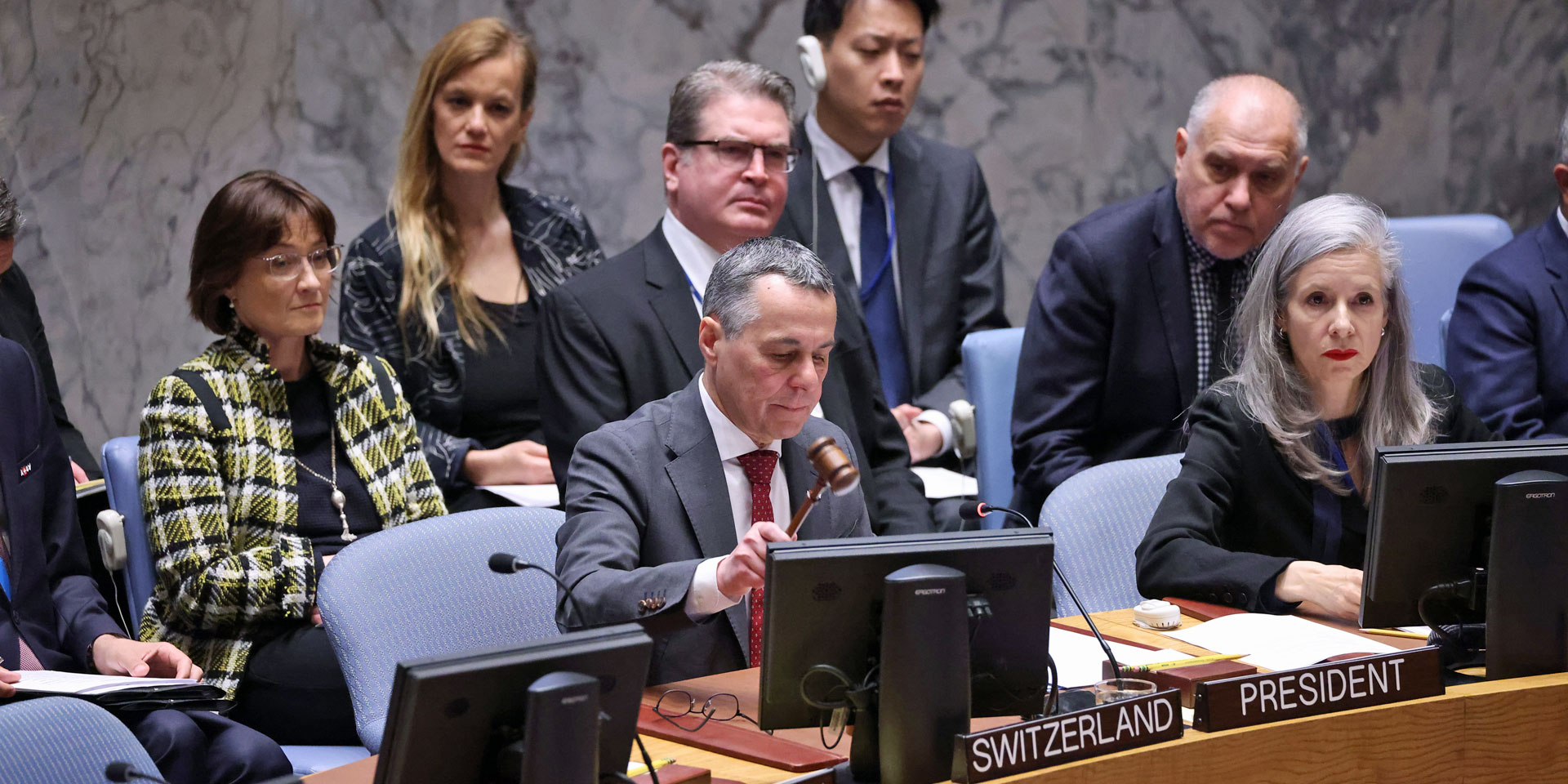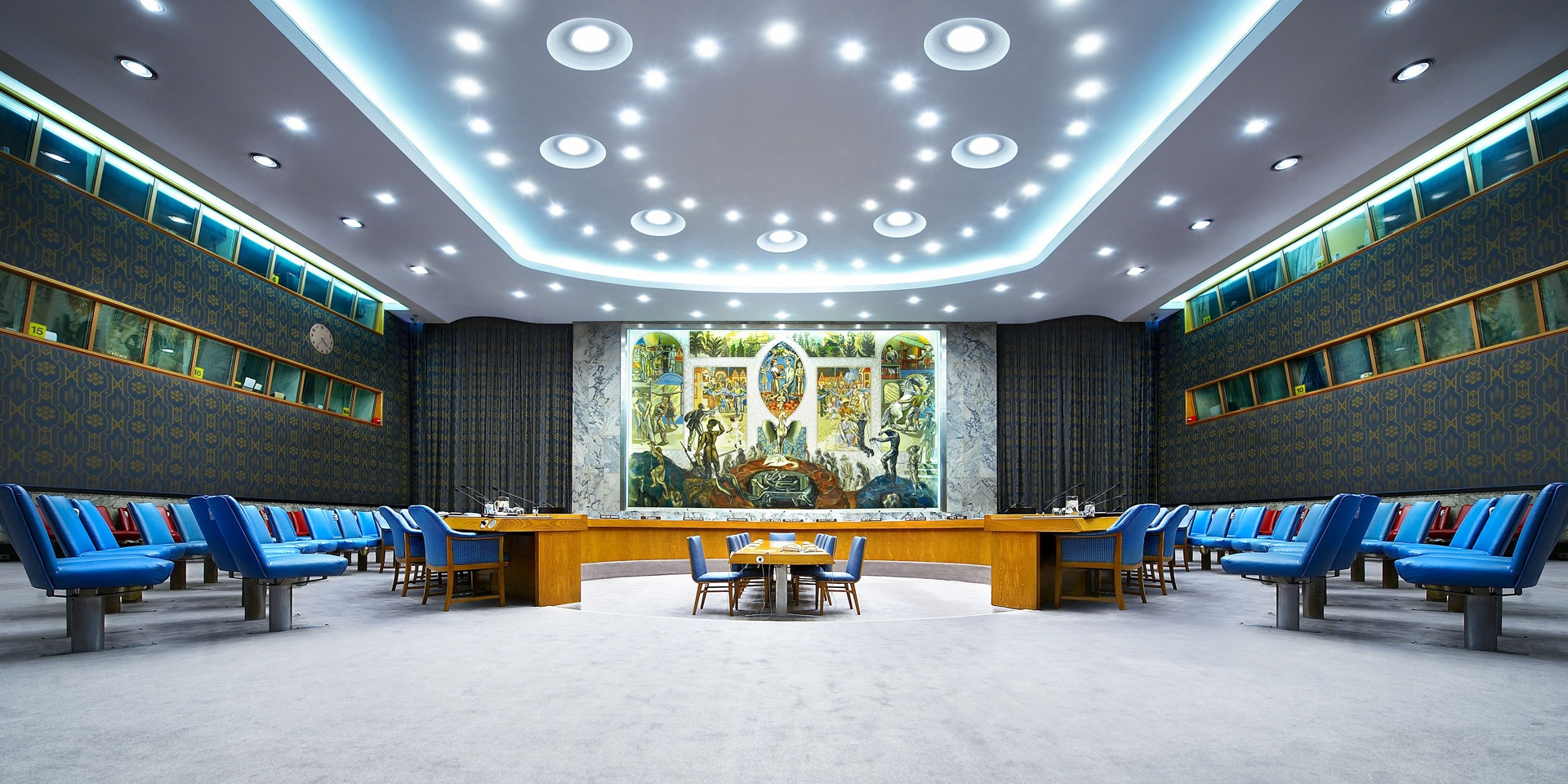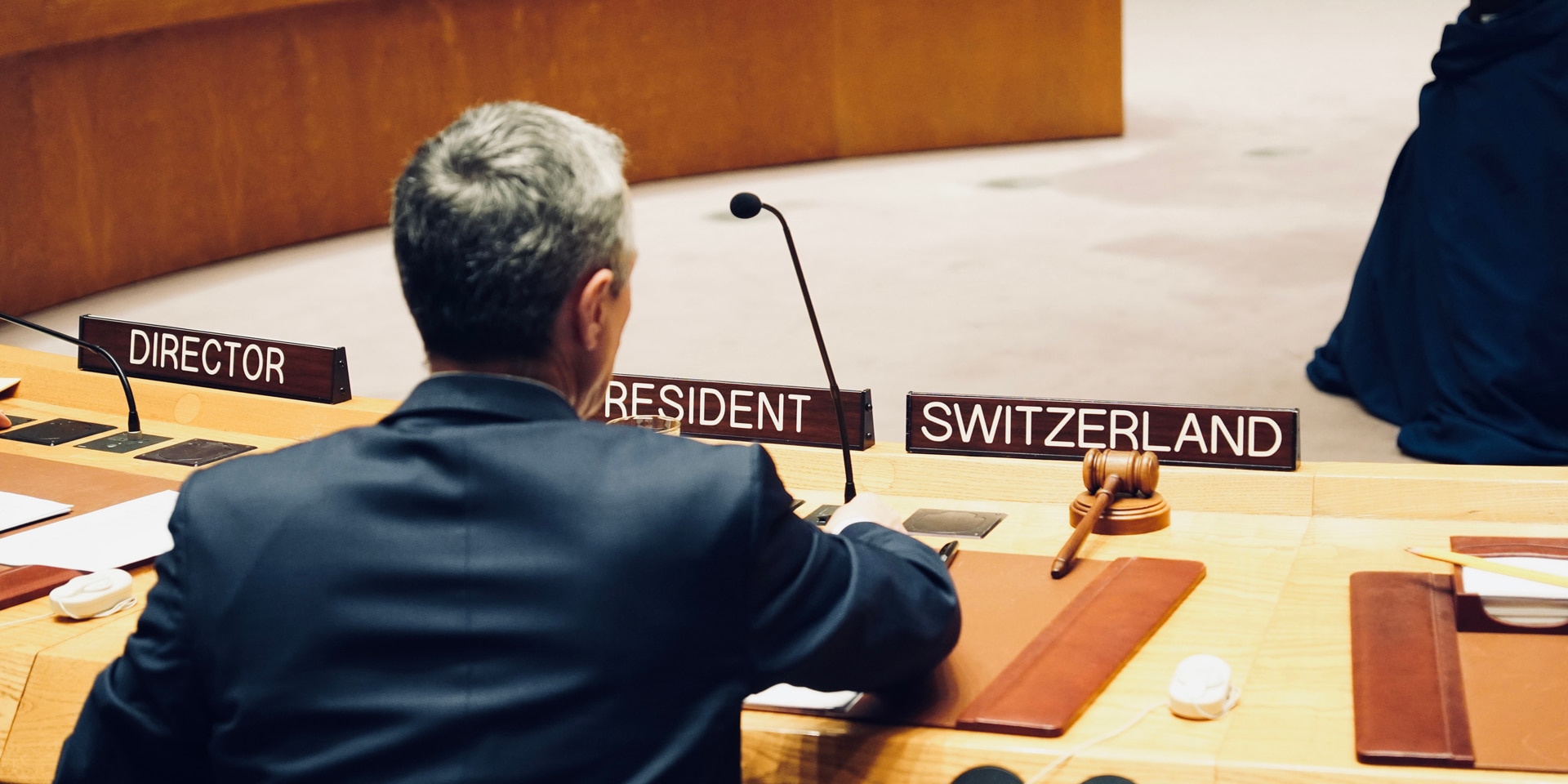Protection for humanitarian personnel: UN Security Council adopts Swiss resolution
On 24 May 2024, the UN Security Council adopted a resolution for the protection of humanitarian and UN personnel in conflict zones. The resolution, which was negotiated and submitted by Switzerland to the Security Council for a vote, highlights the country's long-standing commitment to the protection of civilians – a priority of the Federal Council for Switzerland's 2023–24 term on the council. Voices of people within the FDFA who worked intensively on the resolution.
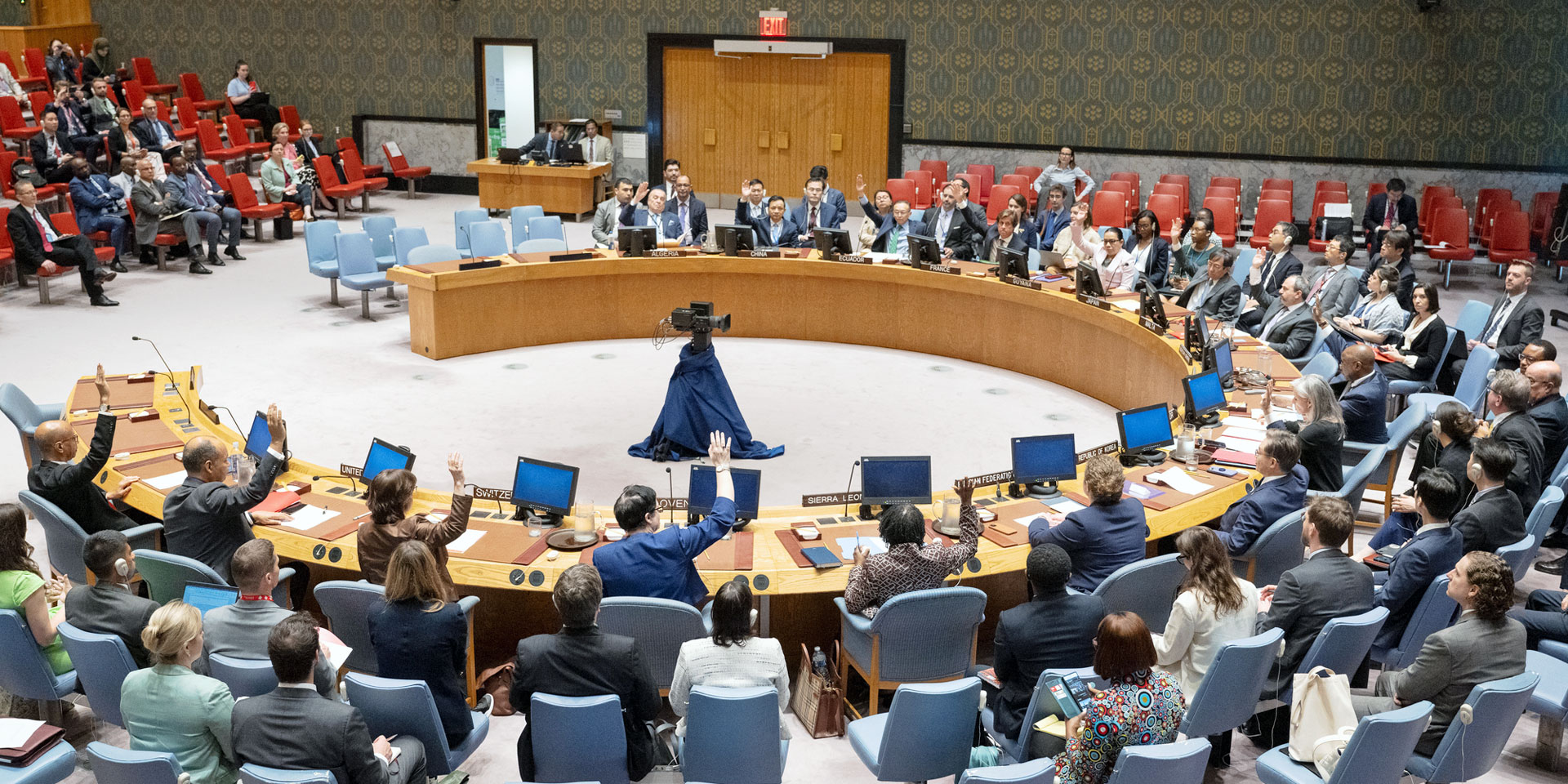
The UN Security Council adopts the Swiss resolution on the protection of humanitarian personnel on 24 May 2024. © UN Photo
The number of armed conflicts worldwide is increasing rapidly. While the world was confronted with around 20 conflicts at the turn of the millennium, this number has now surged to over 120 armed conflicts. Millions of people on almost every continent are in need of humanitarian aid, while the humanitarian and UN personnel providing this vital aid are facing increasing pressure and becoming victims of attacks themselves. More than 500 humanitarian aid workers were victims of violence in 2023, with over 250 killed. Over the past decade, the number of victims from humanitarian aid organisations has risen by more than 50%, with 90% of those affected being national or local employees.
Switzerland is deeply concerned about the increasing violence against people who provide aid. Such attacks take place in all conflict regions and often hinder life-saving measures. As an elected member of the UN Security Council, Switzerland took the initiative to negotiate a draft resolution on the protection of humanitarian and UN personnel. The adoption of the resolution is an important signal for the protection of civilians.
Various divisions of the FDFA and Switzerland's missions to the UN in New York and Geneva as well as the DDPS have worked intensively on the resolution over the past few months. Janique Thöle, lawyer at the Directorate of International Law, Vincent Conus, diplomat at the mission in New York, Julia Ismar, Programme Coordinator Protection at the Swiss Agency for Development and Cooperation (SDC), Gilles Cerutti and Jasmin Gut at the Peace and Human Rights Division (PHRD) as well as the Security Council team of the UN Division explain the background and functioning of this resolution.
What does Switzerland intend to achieve with this resolution?
Esther Neuhaus: The starting point for this resolution are the numerous attacks to which employees of humanitarian organisations and the United Nations are exposed these days. This protection is not just a goal in itself: it enables humanitarian access to people in need and ensures that the population does not have to struggle for the goods they need to survive.
Janique Thöle: The resolution recalls the obligation of the parties to enable and facilitate safe, rapid and unhindered humanitarian access to the population while ensuring the safety and freedom of movement of humanitarian personnel and UN staff. With special reference to national or locally recruited personnel, the protection of those workers who are most exposed to threats and violence is reaffirmed. The resolution also addresses impunity and insufficient co-operation in this area and calls on the Secretary-General to make recommendations within six months on measures to prevent and respond to attacks on humanitarian and UN personnel and to ensure accountability. Finally, it asks the Secretary-General to inform the Council on an annual basis.
Hybrid forms of warfare, such as disinformation, are now also commonplace in armed conflicts. Does the resolution also take this aspect into account?
Peace and Human Rights Division: Disinformation and the manipulation of information are not new phenomena, but new technologies such as artificial intelligence are increasing their impact and spread. This is particularly the case in the context of peace missions. As the resolution emphasises, disinformation campaigns can undermine trust in humanitarian personnel, UN staff and local personnel and put them at risk. These developments also have a negative impact on the civilian population in armed conflicts. The resolution encourages states and the UN to take appropriate measures to counter these phenomena in order to protect humanitarian personnel.
The Swiss Agency for Development and Cooperation is also active with humanitarian aid in various contexts. What does the adoption of the resolution mean for the SDC?
Julia Ismar: The majority of contexts in which the SDC is involved in humanitarian aid are characterised by armed conflicts. In these situations, we are dependent on cooperation with the parties to the conflict, access to the people affected and, of course, the safety of our colleagues and partners. This is a basic requirement in order to be able to work on the ground and provide protection and humanitarian aid for the people affected. It is also in line with applicable international humanitarian law. The fact that the Security Council has politically reaffirmed the relevant norms with this resolution is anything but trivial – the high number of victims among humanitarian actors in current conflicts shows how important it is to stand up for international humanitarian law with determination. The explicit mention of national and local personnel and national humanitarian actors in the text of the resolution is particularly noteworthy. Our local colleagues are the backbone of humanitarian aid – and are therefore often extremely exposed.
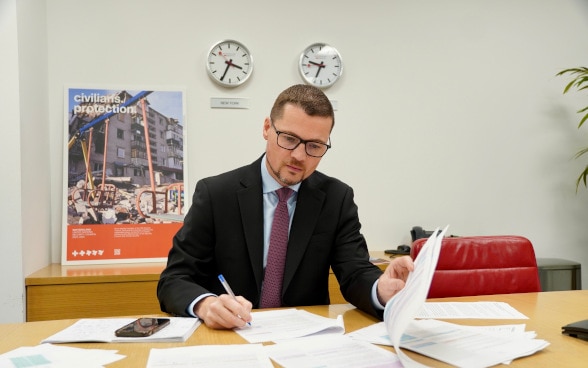
Switzerland has introduced this new resolution. How did Switzerland go about it? How should we imagine the work in New York?
Vincent Conus: We started from a simple but very worrying observation: the increase in violence and attacks on humanitarian actors around the world, which jeopardises humanitarian activities. The Swiss resolution reflects this urgency and is a response to it. This situation clearly requires the Council's attention.
We began negotiations on this draft resolution at the end of March, noting members' interest in this important issue and capitalising on the momentum. We therefore endeavoured to best serve this objective of the Council by drawing on Switzerland's long experience in the field of humanitarian aid, its commitment to protect civilians in conflict and its expertise in the field of international humanitarian law. On the other hand, we were able to count on the strong support of the other nine elected members, enabling the Council to send a strong signal by adopting this resolution. The resolution also received broad support from outside the Council and from humanitarian actors with whom we continued to liaise closely.
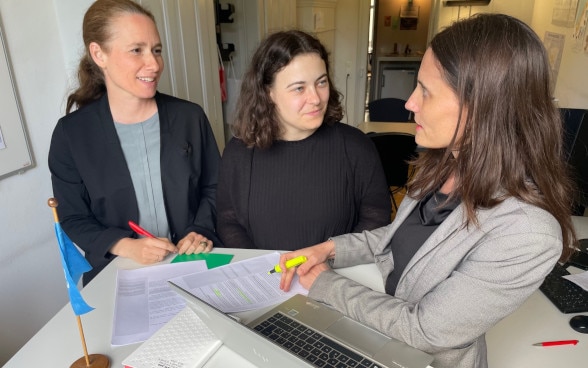
What role did the UN Division play in the adoption of the resolution?
Barbara Gonzenbach: The Security Council team in Bern coordinates all UN Security Council activities. We discussed the resolution’s draft text and the UN Security Council members’ comments with the interested services here in Bern and sent instructions to our colleagues in New York for each round of negotiations. The time difference between New York and Bern worked in our favour: The mission sent us the latest developments overnight and we had a head start here every morning to collate the feedback.
Simona Dörig: Among others, the Directorate of International Law, the Peace and Human Rights Division, the Swiss Agency for Development and Cooperation, the Swiss Mission in Geneva and the State Secretariat for Security Policy of the DDPS played an active role. After almost a year and a half on the Security Council, cooperation with the various services is very well established.
What is the link between this resolution and the 75th anniversary of the Geneva Conventions?
Janique Thöle: The resolution emphasises the rules of international humanitarian law (IHL) that protect humanitarian and United Nations personnel, their premises and their property. It reaffirms protection that these persons enjoy as civilians and also strongly condemns all attacks and forms of violence against them. Without creating new obligations, the resolution requires parties to the conflict to fulfil their obligations under international humanitarian law. Parties must comply with IHL in all circumstances and at all times, even in the absence of reciprocity. Those who violate IHL are subject to accountability measures, both at national and international level.
This year marks the 75th anniversary of the Geneva Conventions, which are the cornerstone of international law and reflect our common humanity. Having been universally ratified, they are more relevant today than ever. Their implementation is crucial to save lives.
What role did Switzerland's humanitarian tradition play in this resolution?
Vincent Conus: Switzerland's long humanitarian tradition and its commitment to international law are recognised in the Security Council. The fact that Switzerland is leading this initiative was therefore perceived as legitimate and welcome. As we celebrate this year the 75th anniversary of the Geneva Conventions and the 25th anniversary of the Security Council recognising the protection of civilians as part of its agenda, it is crucial to reaffirm the Council's commitment to international humanitarian law. This is especially true in the context of the numerous crises the world is facing – a situation that has never been seen since the creation of the United Nations.

